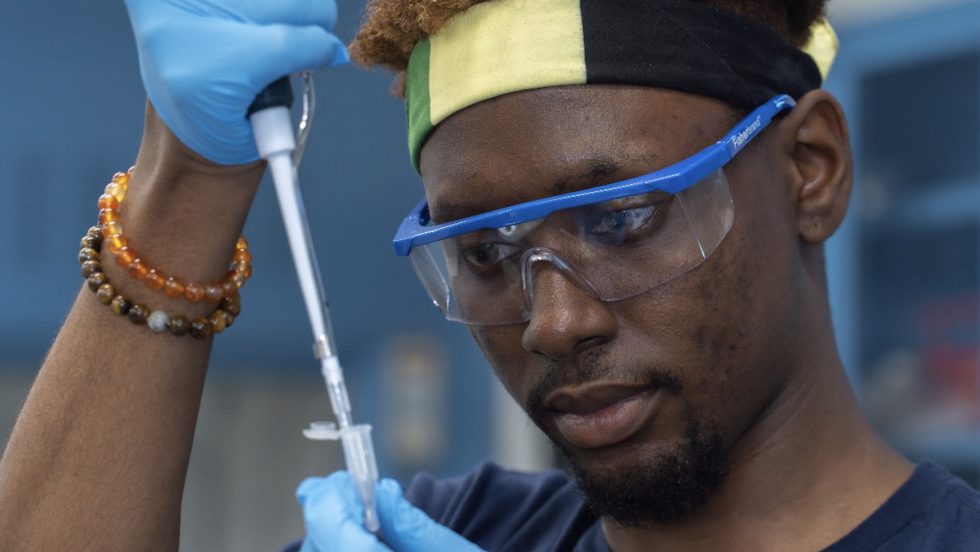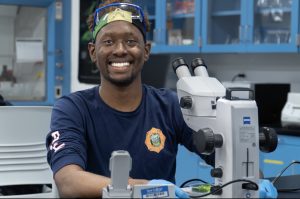Isaiah Johnson: Flying High Toward a Career in Space Medicine

Now in his third year of college, and his first year at New College of Florida as a transfer student, Isaiah is aiming for a career that brings those two passions together in aerospace physiology.
Aerospace physiology deals with health problems specifically associated with space travel. There are a multitude of problems that can occur in space including hypoxia, decompression sickness, trapped gas expansion, and a multitude of other physiological changes that are associated with space travel.
Training for his Passion
Born and raised in West Palm Beach, Isaiah spent his first two years of college at two private colleges, Embry Riddle Aeronautical University, where he was accepted into the Aerospace Physiology program in 2018, and then Everglades University in Boca Raton. He spent the past three summers taking part in Project Possum, a program conducting upper-atmospheric and aeronautic research, along with immersive astronaut training. He was also accepted into the International Institute of Aeronautical Sciences.
Project Possum teaches all of the skills required to conduct research on the next generation of commercial space vehicles. It was initially designed and instructed by former astronaut instructors and Possum team scientists. Project Possum trains students in much the same way that astronauts are trained, and students receive certification showing all of the immersive programs they have completed.
The Road to New College
“Starting back when I was in high school, I knew I wanted to study medicine because I do have medicine nerds in my family. My mom is currently a physician working in nephrology. I wanted to pursue medicine, but I didn’t know quite which direction I wanted to take. I had a huge passion for physics and mathematics, anatomy and physiology. The question was, how could I put all of those together and be able to have that as a career,” he said.

“I remember a group from NASA came to our high school, which was a STEM school. They spoke about the growing private sector opportunities in space exploration, mainly from a science, technology and engineering point of view. Though my interest was more about biology and medicine, when I had a private conversation with them, they told me about career opportunities for aerospace physiologists, or space physicians,” Isaiah recalls.
“Once I learned that its focus was on the study of the human body in space and the harsh environments that would be encountered, I knew I had found my path,” he said. “They are called flight surgeons at NASA. And I knew that’s what I wanted to do. There are some flight surgeons who go into space and work directly with the astronaut crews, and there are many more who stay on the ground and instruct astronauts on what to do should a problem arise while they are in space.”
Both Embry Riddle and Everglades universities proved to be very expensive, and Isaiah was looking for a school where he could keep his debt down and that was less lecture-oriented and more interactive in nature.
Isaiah did his due diligence before transferring to New College. “I did a lot of research to make sure New College was the school for me. I visited the campus, talked with some of the professors and really liked what I saw. My parents also thought it was an awesome environment for me,” he said.
“When I left Embry Riddle, mainly for financial reasons, I was no longer able to major in aerospace physiology,” Isaiah said. “I chose to take a different, much more affordable route. At New College, I am majoring in neuroscience applied mathematics.”
“At so many schools, the professor doesn’t even know your name. You are just sitting in a huge lecture hall, watching slides fly by, and basically teaching yourself. That’s not how I wanted to learn. I wanted one-on-one learning interaction, and that’s what New College of Florida has provided me. At New College, I am able to go interact with my professor frequently, am able to establish amazing tutorials and benefit from smaller class sizes. It’s exactly what I was looking for,” Isaiah said.
“One thing I have enjoyed at New College is being able to create my own tutorials,” Isaiah said. “I am a teacher’s assistant for both anatomy and physiology classes. I also have a club on campus – a carnivorous plant club, which educates the community about Venus Flytraps, and how when they close their mouths, they are creating gravity. What I hope to do with that, though it will take years, is study how we might use Venus Flytraps on Mars. I am also involved in a study on fungi, its stress adaptability and how it thrives off of radiation. There is a major study underway on cultivating one particular fungi on Mars so there will be less radiation in the atmosphere should astronauts decide to explore the planet. I also am working with anatomy and physiology professor Amy Bohan on a tutorial that would create a class about space exploration in hostile environments. I don’t know any other college where I would have been able to do that,” Isaiah said.
After New College
“As my next step, after graduating from New College in 2024 or 2025, I will be attending medical school, hopefully at the University of Texas in Arlington, where they have a specialized program in space medicine,” Isaiah said.
“After that, if I could shape my career in any way I wanted, I would be employed as a flight surgeon for NASA. Of course, that means I would have to undergo additional training in order to become an astronaut, if I wanted to serve as a flight surgeon on the International Space Station. That is a very selective program, but given the fact that I have completed Project Possum and received my certification, it increases my chances of getting selected for the program,” he said.
Gayle Guynup is a contributor to the New College News.
